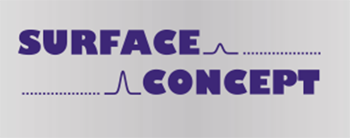Surface Concept
We make complex detector, microscopy, spectroscopy and laboratory systems manageable and thus enable them to be widely accepted and used. Everything we develop and produce should be usable as a module, assembly or system for a future-oriented, fully digitalized, partially or fully automated laboratory analysis or for your (automated) production-accompanying quality management.
Surface Concept GmbH is an owner-managed high-tech manufactory with currently 13 permanent employees. All products of Surface Concept GmbH were developed or co-developed by shareholders and employees of Surface Concept GmbH.
Our employees have many years of experience in the fields of spectroscopy and microscopy, imaging detection with temporal correlations as well as ultra-fast electronics, high-speed data acquisition and laboratory automation.
Our work is customer- and service-oriented and we can implement many customer-specific solutions quickly and efficiently for you with the help of a multitude of already developed product modules.
For more than 10 years, Surface Concept GmbH has been the leading manufacturer of imaging and time-resolving electron, ion, UV and X-ray detectors with delayline anodes as well as picosecond time measurement devices and picosecond electronics.
We produce and supply special and high-end detectors for industrial analysis and for research and development as well as for transmission and scanning electron microscopes. We produce and supply complete ToF spectrometers, electron momentum microscopes, imaging electron spin detectors, super resolution fluorescence microscopes as well as electronic products or assemblies for applications in the nanosecond and picosecond range, for measurement and control tasks and for laboratory automation up to highly stable high voltage and current sources.
Surface Concept GmbH produces time-of-flight (ToF) spectrometers and parallel imaging electron momentum microscopes (with ToF or hemispherical energy filter) on the basis of unique and patented electron optics.
In the years 2010 to 2016, Dr. Christian Tusche, Prof. Dr. Juergen Kirschner and colleagues at the Max Planck Institute Halle and Prof. Dr. Gerd Schoenhense and employees of the University of Mainz developed revolutionary improved electron optics for time-of-flight or hemisphere energy analyzers (patents DE102013005173C5, DE102014018555B3 and DE102017126882B3).
Surface Concept GmbH holds the worldwide exclusive license rights for the commercialization of these momentum microscopes, especially for the design with parallel imaging spin detectors, which are also patented (Patent DE102005045622B4).
All our current momentum microscopes are based on this licensed development. A special version of such an momentum microscope based on the patented high-end development is produced and marketed by Specs Surface Nano Analytik GmbH in Berlin under the product name KREIOS-MM by means of a sublicense granted by Surface Concept GmbH. Also the product METIS of Specs Surface Nano Analytik GmbH is based on the patented core of the Surface Concept k-ToF momentum microscope, developed and produced by Surface Concept GmbH.
The company Focus GmbH in Huenstetten uses a sublicense granted by Surface Concept GmbH to produce imaging spin detectors for its NanoESCA momentum microscopes.
Surface Concept GmbH holds licenses for the production of super resolution microscopes based on the localization microscopy method SPDM phymod (a stochastic localization method which is significantly improved and patented compared to STORM or PALM, patent EP2265931B9).
We have developed an universal fluorescence microscopy platform (nanoFLeyeTM) with a high degree of automation that covers both, classical fluorescence microscopy and TIRF microscopy up to SPDM super resolution (analogous to dSTORM) with resolutions of less than 20 nanometers. A patented method of automatic super resolution is used. A special camera system (ReconFlexTM) was developed in order to support live automated reconstruction of localization in the nanometer range.
Our strength is the automated and flexible technical design of the microscope hardware and the automation of the SPDM method, which makes it possible to use such microscopes online and remote controlled and to obtain super resolution images in a very short time without subsequent evaluation steps.


